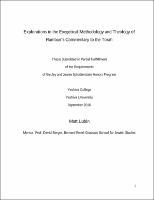Please use this identifier to cite or link to this item:
https://hdl.handle.net/20.500.12202/4162Full metadata record
| DC Field | Value | Language |
|---|---|---|
| dc.contributor.author | Lubin, Matt | |
| dc.date.accessioned | 2018-11-08T20:23:29Z | |
| dc.date.available | 2018-11-08T20:23:29Z | |
| dc.date.issued | 2016-09 | |
| dc.identifier.uri | https://hdl.handle.net/20.500.12202/4162 | |
| dc.identifier.uri | https://repository.yu.edu/handle/20.500.12202/4162 | |
| dc.description | Honors thesis / Open Access | |
| dc.description.abstract | Today, there is almost no question that the most recognized name in medieval Jewish philosophy is Moses Maimonides, but this great familiarity of Maimonides as a personal figure does not necessarily mean that he had the greatest influence on Jewish philosophy. Ten years before Maimonides’ death in 1204 another Moses was born in Catalonia, whose work and influence would rival that of his older namesake: Moses Nahmanides, or “Ramban”. In his lifetime, he was recognized as the intellectual leader of Iberian Jewry, and in that capacity played historic roles in his highly influential (if ambiguous)1 stance on the raging controversy regarding the study of philosophy, as well as in his defense of the Jewish faith against Christianity in the court of King James I of Aragon. His extraordinary scholarship extended to almost all areas of Jewish intellectual activity, in both form and content, publishing Talmudic and biblical commentaries, sermons, theological treatises, works on Jewish law, and poetry. The staggering breadth and comprehensiveness of his scholarly output, however, is best seen not by noting his versatility in genres of writing, but by studying his specific rabbinic works. While his Talmudic commentaries sufficiently testify to his broad knowledge of both Spanish and Franco-German traditions and methods of Talmudic interpretations, the true expanse of his near-comprehensive mastery of all of Jewish literature is best exemplified by what endures as his most popular achievement: his Commentary to the Torah. | en_US |
| dc.description.sponsorship | Jay and Jeanie Schottenstein Honors Program | en_US |
| dc.language.iso | en_US | en_US |
| dc.publisher | Yeshiva College | en_US |
| dc.rights | Attribution-NonCommercial-NoDerivs 3.0 United States | * |
| dc.rights.uri | http://creativecommons.org/licenses/by-nc-nd/3.0/us/ | * |
| dc.subject | Naḥmanides, approximately 1195-approximately 1270. Perush ha-Torah. | en_US |
| dc.title | Explorations in the Exegetical Methodology and Theology of Ramban’s Commentary to the Torah | en_US |
| dc.type | Thesis | en_US |
| Appears in Collections: | Jay and Jeanie Schottenstein Honors Student Theses | |
Files in This Item:
| File | Description | Size | Format | |
|---|---|---|---|---|
| Matt-Lubin.pdf | 532.86 kB | Adobe PDF |  View/Open |
This item is licensed under a Creative Commons License

